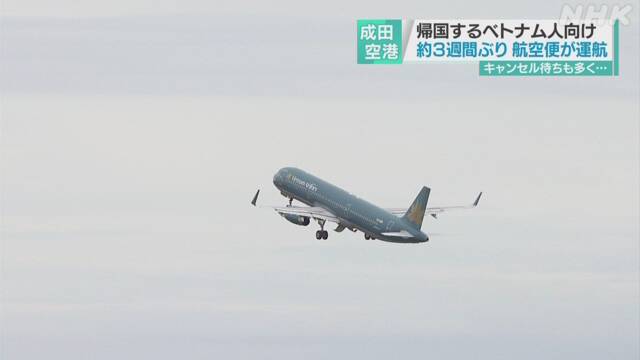Due to the spread of the new coronavirus, a flight for Vietnamese returning from Japan, which had been suspended for nearly a month, was operated from Narita Airport on the 5th, and many Vietnamese wishing to return to the airport. It was a rushing situation.
In Vietnam, there are currently no regular flights from Japan due to border measures associated with the spread of the new coronavirus infection.
For this reason, the Vietnamese government operates "rescue flights" so that Vietnamese living in Japan who have special circumstances such as illness or pregnancy can return to Japan preferentially, but border measures have been further strengthened and mid-last month. Since then, the service has been suspended for nearly a month.
On the 5th, two rescue flights to Vietnam were operated for the first time in about three weeks at Narita Airport, and a total of more than 300 people, including Vietnamese technical intern trainees and international students returning home, boarded in a long line.
A Vietnamese student returning home said, "I've been hoping to return home for a year and I can finally go home. I'm very happy to see her and my parents."
On the other hand, near the check-in counter of the rescue flight, many people were waiting for cancellation because they could not get the ticket in advance.
The international lobby of Narita Airport is usually quiet due to the influence of the new Corona, but on the 5th, airline staff were guiding people who gathered to return to Japan.
According to the Vietnamese embassy, there are about 7,000 Vietnamese who want to return from Japan as of the end of last month, but so far, the embassy has 5 rescue flights operating from Narita Airport this month. We have announced that there are only two flights a day.
Difficult to return to Japan due to Vietnam's border measures
Why is it difficult for Vietnamese living in Japan to return home?
According to the Vietnamese embassy, the background is that in Vietnam, where the spread of infection has been suppressed so far, the infection has spread again since the end of April.
Infections with mutant viruses have also been confirmed one after another, and the Vietnamese government has strengthened "waterfront measures" and extended the quarantine period for returnees and immigrants.
However, the number of flights to Vietnam is limited due to the limited capacity of facilities that isolate returnees in Vietnam.
Before the spread of the infection, regular flights to Vietnam, which flew 10 flights a day from Narita Airport, are no longer in service.
For this reason, the Vietnamese government operates "rescue flights" so that Vietnamese living in Japan who have special circumstances such as illness or pregnancy can return to Japan preferentially.
However, because tickets for rescue flights are limited, Nobuhiko Matsumoto, who runs an organization that supports Vietnamese, volunteers to provide accommodation for Vietnamese who cannot return to Japan.
Mr. Matsumoto was asking if there were any Vietnamese who were having trouble returning to Japan at Narita Airport on the 5th.
Mr. Twet (24), a Vietnamese who Mr. Matsumoto spoke to, was 4 months pregnant and did not have a rescue flight ticket.
Although Mr. Tweet came to Japan as a technical intern trainee, he escaped from the training destination in Okayama prefecture due to violence, and he has no money or place to live, and he is moving from one friend's house to another.
Mr. Tweet said with tears, "I am very worried because there is no insurance in Japan. I want to return to Vietnam soon."
In addition, some couples were separated because their partners did not have tickets, and some of them shed tears and spared goodbye.
Mr. Matsumoto said, "There are a lot of consultations that the number of flights returning to Vietnam has decreased and I have lost my place. I want the Japanese side, who has accepted Vietnamese for work and study abroad, to take responsibility until returning to Vietnam." Was there.
The Japanese government also strengthens border measures
On the other hand, the Japanese government is strengthening border measures in response to the spread of infection by the new coronavirus mutated in Vietnam.
From the 4th, the government has started a "detention" measure to inspect returnees and immigrants from Vietnam for 6 days after entering the country, staying at the accommodations secured by the country, out of the 14-day waiting period. ..
On the morning of the 5th, passengers on a flight arriving at Narita Airport from Hanoi boarded the bus and headed for the accommodation after being inspected by the quarantine station.
Vietnamese health officials have released an analysis showing that yet another mutation was detected in the first mutated virus found in India.
A Japanese man in his 60s who returned from Vietnam said that he had returned to Japan temporarily to receive the vaccine. . I will spend six days paying attention to lack of exercise because it is unavoidable to stay at the accommodation. "

